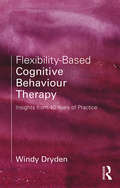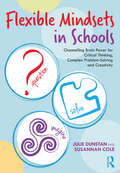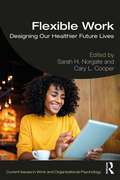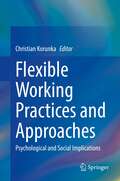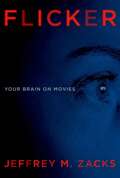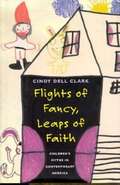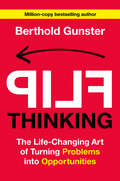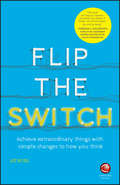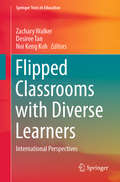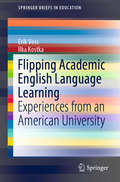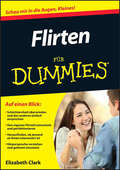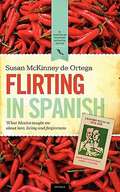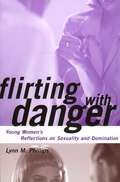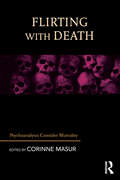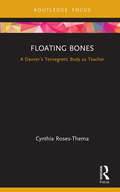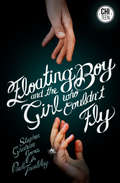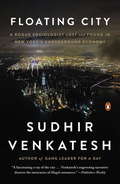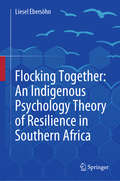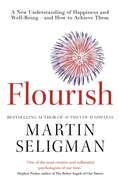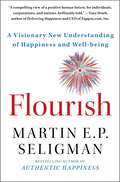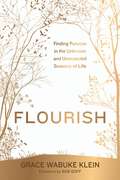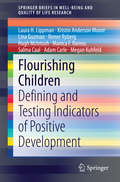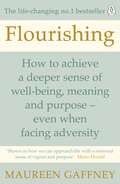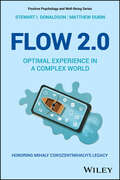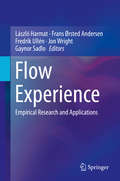- Table View
- List View
Flexibility-Based Cognitive Behaviour Therapy: Insights from 40 Years of Practice
by Windy DrydenIn this book, Windy Dryden brings together the four major strands that have shaped his idiosyncratic approach to clinical practice – (i) Cognitive Behaviour Therapy; (ii) flexibility in practice; (iii) Rational Emotive Behaviour Therapy; and (iv) pluralism – an approach he calls ‘Flexibility-Based Cognitive Behaviour Therapy’. Perhaps uniquely for the literature, this volume provides an extended account of how a world-leading therapist personally thinks about and practices psychotherapy. As well as insights from over 40 years as a therapist, the book reflects the most the recent developments in Dryden’s work, and highlights both the different theories he is using and the core building blocks of his practice. Aimed at therapists in training and practice, Flexibility-Based Cognitive Behaviour Therapy presents a rare opportunity to gain an insight from one of the leading figures in the field of psychotherapy.
Flexible Mindsets in Schools: Channelling Brain Power for Critical Thinking, Complex Problem-Solving and Creativity
by Julie Dunstan Susannah ColeFlexible Mindsets in Schools abandons painstaking evolution in favour of a bold, transformative revolution. It blends research and easily implementable practice to drive solutions that give learners and educators the freedom to become self-directed: to unleash questioning, problem-solving and creativity. This key text explores how to blend existing and new practices and unlock the potential of student agency as the pathway towards resilience and adaptation. The Flexible Mindsets Model fuses three components that rely on each other to drive self-directed learning: metacognition, "I CAN" mindset messages and executive function processes. This book presents a roadmap for how to create an environment and culture where learners are aware of what works when, feel safe to take learning-related risks, believe that they are capable and have the tools they need to learn. Flexible Mindsets in Schools will give educators hope that there is a way to revolutionise education to meet the needs of students during these uncertain times by taking small, manageable steps.
Flexible Work: Designing our Healthier Future Lives
by Cary L. Cooper Sarah H. NorgateFlexible Work: Designing Our Healthier Future Lives examines flexible working through the lens of social science, in particular using psychological perspective to address not only what forms of flexible working there are and how they are evolving but also their prospect in the future of work. Bringing together views from thought-leaders and underpinned by research evidence, this book addresses two of the most fundamental business challenges for large and medium organisations – mental health and productivity – calling for the bridging of science and policy to design flexible working for our future healthier lives. Growing from these foundations, this book explains the latest landscape in flexible working, looking at employee psychological health and productivity, including showing up for work sick. Perspectives are provided from around the world on leadership, line management, ‘over attachment’ with technology, commuting, skill-based inequality and control over working time. Readers are offered insights into the relevance of flexible working for a diverse workforce – invisible disabilities, disabilities, older workers and blended families. Throughout, the book offers suggestions for shaping future policy, practice and research. Each chapter concludes with recommendations, making this essential reading for students, academics, human resource practitioners, policy-influencers, policymakers and professionals interested in flexible work.
Flexible Working Practices and Approaches: Psychological and Social Implications
by Christian KorunkaModern workplaces are following a strong trend of increasing flexible working practices and approaches, offering more flexibility in working times, working places, work organization, and work relations as the result of new information and communication technologies. This book brings together a group of internationally recognized experts in the field of flexible work to examine the psychological and social implications of these practices, describing the current state of research and empirically-based practices in this field. It focuses on organizational, job, and individual factors related to the quality of working life, and identifies potential risk groups where the benefits of flexible work are suppressed or not realized.Ideal for organizations implementing or considering implementing flexible work, for professionals and researchers in work and organizational psychology, and for HR professionals, this volume is an invaluable overview of rapidly changing work norms and their impact on working life.
Flicker: Your Brain On Movies
by Jeffrey ZacksHow is it that a patch of flickering light on a wall can produce experiences that engage our imaginations and can feel totally real? From the vertigo of a skydive to the emotional charge of an unexpected victory or defeat, movies give us some of our most vivid experiences and most lasting memories. They reshape our emotions and worldviews--but why? In Flicker, Jeff Zacks delves into the history of cinema and the latest research to explain what happens between your ears when you sit down in the theatre and the lights go out. Some of the questions Flicker answers: Why do we flinch when Rocky takes a punch in Sylvester Stallone's movies, duck when the jet careens towards the tower in Airplane, and tap our toes to the dance numbers in Chicago or Moulin Rouge? Why do so many of us cry at the movies? What's the difference between remembering what happened in a movie and what happened in real life--and can we always tell the difference? To answer these questions and more, Flicker gives us an engaging, fast-paced look at what happens in your head when you watch a movie.
Flights of Fancy, Leaps of Faith: Children's Myths in Contemporary America
by Cindy Dell ClarkSanta Claus, the Easter Bunny, the Tooth Fairy-is there still a place for these legendary creatures in today's skeptical age? Is it "right" for children to believe in them? By encouraging these myths, are parents lying to children? Moreover, do these figures undermine religious faith and encourage rampant materialism in children? In Flights of Fancy, Leaps of Faith, Cindy Dell Clark went right to the believers-American children-to explore how children themselves give meaning to Santa, the Easter Bunny, and the Tooth Fairy. Through interviews and observation conducted in real-life settings from homes to shopping malls during the holidays, she asks whether believing in these figures is good or bad for children. Using their insights, she offers fresh, new interpretations about tooth loss as a rite of passage, about Christmas (including the role of the family and the Christmas tree), and about Easter customs (including the Easter egg hunt) in contemporary America. Clark challenges the notion that the figures are merely "imaginary." She demonstrates how children actively shape these traditions through their own creativity and beliefs. And because they require the child's faith in order to be experienced, they play an important and singular role in a child's psychological development. Through the mysteries and myths of Christmas and Easter, families balance the values of receiving and giving, of growth and sacrifice. Each aspect of the Santa myth, from his slide down a chimney to his big red suit, plays a part in a child's imagination. Through their offerings of milk and cookies and their letter writing, children bring their relationship to Santa into developing attitudes toward giving and receiving gifts. The Easter Bunny story, with its ritual egg hunt and baskets of brightly colored candy, is explored in terms of life and its possibility of growth. In these examples, Clark shows how children play an active role in constructing family rituals and cultural reality, since their willingness to make the stories their own helps to renew the traditions. This engaging look at our central symbols will hold great interest for parents, as well as for teachers, psychologists, and other professionals concerned with childhood culture. Complete with children's vivid testimonies and colorful illustrations, it is a revealing journey into a child's mind and world.
Flip Thinking: The Life-Changing Art of Turning Problems into Opportunities
by Berthold Gunster&“Transformative.&”—Greg McKeown, New York Times bestselling author of Essentialism and EffortlessChange your mindset from problem-focused (&“yes, but&”) to opportunistic (&“yes, and&”) using omdenken, the Dutch art of flip thinking—from the bestselling author and founder of the omdenken philosophy.Imagine this: You&’ve got a great idea, and all you hear are the yes-buts. &“Yes, but that&’s been tried before, and it didn&’t work.&” &“Yes, but shouldn&’t we just let it sit for a while?&” &“Yes, but what if it doesn&’t work?&” Published in English for the first time, this international bestseller introduces the power of omdenken—or flip thinking—to transform stuck-in-the-mud, pessimistic thought into an inventive, curious mindset, so you can stop saying &“yes, but&” to life, and start saying &“yes, and.&”In this riveting book, Berthold Gunster presents fifteen strategies to transform your thoughts away from limitations and negativities and towards possibilities and opportunities. From disrupting (turn all the rules upside down) to flaunting (play up what you want to hide), from importing (get the enemy on board) to amplifying (do more of what works), Gunster&’s strategies and stories will have you approaching even the most challenging problems—whether an annoying neighbor or an angry colleague or an unhappy partner—in a whole new way.
Flip the Switch: Achieve Extraordinary Things with Simple Changes to How You Think
by Jez RoseA hilarious argument for change from international behaviour expert Jez Rose Do you ever wonder why achieving results is such a struggle? Do you want that to change? Let Jez show you how to train your brain differently by uncovering strategies used by some of the most successful people in the world. Using real-world examples the former comedian examines why some people struggle to achieve, despite trying, while others appear to achieve extraordinary results. Jez will show you why we behave the way we do and how to change for the better. By changing the way we think, our behaviour and approach to life will also change. Aware that our success is also a result of other people, Flip the Switch will show you how to improve the behaviour and thought patterns of those around you too. Practical exercises to get you thinking differently Learn how to change for the better using a variety of techniques Get the confidence to go after what you want, when you want Become extraordinary by adopting Jez's down to earth and charismatic approach Flip the Switch: Achieve Extraordinary Things with Simple Changes to How You Think will change how you approach success and leave you ready to take on the world.
Flipped Classrooms with Diverse Learners: International Perspectives (Springer Texts in Education)
by Noi Keng Koh Zachary Walker Desiree TanThis book addresses the background of classroom flipping, explores the theoretical underpinnings for why flipping works, and shares current success stories in practice. It provides diverse international examples of classroom flipping for all ages, includes discussions of the authors’ studies in the context of the existing research, and illustrates the impact that classroom flipping has had across a range of educational settings instead of focusing on a specific domain or learner context. Intended as a handbook for practitioners, the analysis of commonly used, highly effective techniques for learners of various ages fills a major gap in the literature. It offers a valuable resource for educators, helping them make the flipped learning experience an impactful and meaningful one.
Flipping Academic English Language Learning: Experiences from an American University (SpringerBriefs in Education)
by Erik Voss Ilka KostkaThis book draws on theory, research, and practice-oriented literature to offer an introduction to flipped learning and offer busy instructors advice on how to flip their academic English language courses. The chapters balance theoretical foundations, practical applications, and useful resources for developing materials. The first half of this book defines flipped learning and academic English, describes how it supports English language learning, and explains the role of technology, as well as issues with accountability and feedback. The second half of the book then makes connections between the theoretical issues presented in the first three chapters and the practical applications in the following chapters, which provide lesson descriptions and assessment ideas for language learning contexts with or without access to technology. The book concludes with a list of tools and technologies for developing materials and activities, as well as additional resources for professional development and further exploration of flipped English language learning.
Flirten für Dummies
by Elizabeth ClarkFlirten, das ist wie Schmetterlinge im Bauch, Herzklopfen, knisternde Spannnung . . . Würden Sie so gerne, aber trauen sich nicht recht? Dann ist dies das richtige Buch für Sie! Elizabeth Clark zeigt Ihnen, wie Sie das nötige Selbstbewusstsein entwickeln, um jemanden einfach anzusprechen. Sie hilft Ihnen, die richtigen Worte finden und so ins Gespräch zu kommen, und zeigt Ihnen, wie Sie geschickt Körpersprache einsetzen und die Signale Ihres Gegenübers richtig deuten. Außerdem erhalten Sie wertvolle Tipps, wie Sie vermeiden, zurückgewiesen zu werden und den richtigen Zeitpunkt für den nächsten Schritt finden.
Flirting in Spanish: What Mexico Taught Me About Love, Living and Forgiveness
by Susan McKinney De OrtegaA woman of privilege falls in love with a much younger and uneducated man in Mexico. Together they discover that love has no boundaries. McKinney recounts the joys and struggles of crossing cultural borders and building a life she had never imagined.
Flirting with Danger: Young Women's Reflections on Sexuality and Domination (Qualitative Studies in Psychology #8)
by Lynn PhillipsHow young women make sense of, resist, and negotiate conflicting messages on female sexuality and sexual agencyIn Flirting with Danger, Lynn M. Phillips explores how young women make sense of, resist, and negotiate conflicting cultural messages about sexual agency, responsibility, aggression, and desire. How do women develop their ideas about sex, love, and domination? Why do they express feminist views condemning male violence in the abstract, but often adamantly refuse to name their own violent and exploitive encounters as abuse, rape, or victimization? Based on in-depth individual and collective interviews with a racially and culturally diverse sample of college-aged women, Flirting with Danger sheds valuable light on the cultural lenses through which young women interpret their sexual encounters and their experiences of male aggression in heterosexual relationships. Phillips makes an important contribution to the fields of female and adolescent sexuality, feminist theory, and feminist method. The volume will also be of particular use to advocates seeking to design prevention and intervention programs which speak to the complex needs of women grappling with questions of sexuality and violence.
Flirting with Death: Psychoanalysts Consider Mortality
by Corinne MasurThis volume covers a much-neglected topic: the avoidance by psychotherapists and psychoanalysts of the topic of their own mortality and that of their patients. All too often, the psychotherapist or psychoanalyst who is ill is unable to confront this reality in the presence of her patient and fails to prepare the patient for the most permanent goodbye, death. This volume includes nine essays which consider why the psychotherapist and psychoanalyst may find illness, mortality, retirement and termination so difficult. This volume is a collection of essays by psychoanalysts covering the denial of death amongst psychotherapists and psychoanalysts and the effect on clinical practice, the effect of early childhood confrontation with mortality on the professional development of psychoanalysts, illness in the analyst, the death of patients, and termination and retirement as symbolic harbingers of death.
Floating Bones: A Dancer's Tensegretic Body as Teacher
by Cynthia Roses-ThemaFloating Bones charts the author’s journey into tensegrity, which begins in ballet and culminates in a model for addressing one’s body as a teacher. Tensegrity flips traditional biomechanical models such that instead of support coming from the bones, the bones float, and it is the muscles and other soft connective tissue that provide support for the moving body. Using the model of tensegretic experience, Roses-Thema connects somatics, cognition, rhetoric, and reflective practices detailing the means that constructed approaching the body as a teacher. This study presents the argument for extending the models of thinking to include bodily thinking, by citing how the experiential perspective of tensegrity constructs physical evidence of the rhetorical concept, metis, where the body thinks as it moves. This book will be of great interest to students, scholars, and practitioners of dance, theater, and sociology.
Floating Boy and the Girl Who Couldn't Fly
by Stephen Graham Jones Paul TremblayThe author of Mongrels and the author of The Cabin at the End of the World team up to tell a quirky and uplifting fantasy “that will enthrall young teens” (School Library Journal). Things Mary doesn’t want to fall into: the river, high school, her mother’s life. Things Mary does kind of want to fall into: love, the sky. This is the story of a girl who sees a boy float away one fine day. This is the story of the girl who reaches up for that boy with her hand and with her heart. This is the story of a girl who takes on the army to save a town, who goes toe-to-toe with a mad scientist, who has to fight a plague to save her family. This is the story of a girl who would give anything to get to babysit her baby brother one more time. If she could just find him. It’s all up in the air for now, though, and falling fast . . . Fun, breathlessly exciting, and full of heart, Floating Boy and the Girl Who Couldn’t Fly is an unforgettable ride. “Straddles the border between magic realism and weird science . . . an entertaining, thoughtful piece.” —Publishers Weekly “Absolutely adorable . . . The plot was fast paced and driven and it kept me intrigued until the very end. It was [a] really light, easy read.” —Read Rant Review
Floating City
by Sudhir VenkateshAfter his insider's study of Chicago crack gangs electrified the academy, Columbia University sociologist Sudhir Venkatesh spent a decade immersed in New York's underbelly, observing the call girls, drug dealers, prostitutes and other strivers that make up this booming underground economy. Amidst the trust-funder cocktail parties, midtown strip clubs, and immigrant-run sex shops, he discovers a surprisingly fluid and dynamic social world - one that can be found in global cities everywhere - as traditional boundaries between class, race and neighbourhood dissolve. In Floating City, Venkatesh explores New York from high to low, tracing the invisible threads that bind a handful of ambitious urban hustlers, from a Harvard-educated socialite running a high-end escort service to a Harlem crack dealer adapting to changing demands by selling cocaine to hedge fund managers and downtown artists. In the process, and as he questions his own reasons for going deeper into this subterranean world, Venkatesh finds something truly unexpected - community. Floating City is Venkatesh's journey through the 'vast invisible continent' of New York's underground economy - a thriving yet largely unseen world that exists in parallel to our own, at the heart of every city.
Flocking Together: An Indigenous Psychology Theory of Resilience in Southern Africa
by Liesel EbersöhnThis book describes how those individuals who are often most marginalised in postcolonial societies draw on age-old, non-western knowledge systems to adapt to the hardships characteristic of unequal societies in transformation. It highlights robust indigenous pathways and resilience responses used by elders and young people in urban and rural settings in challenging Southern African settings (South Africa, Namibia, Lesotho and Swaziland) to explain an Indigenous Psychology theory. Flocking (rather than fighting, fleeing, freezing or fainting) is explained as a default collectivist, collaborative and pragmatic social innovation to provide communal care and support when resources are constrained, and needs are par for the course. Flocking is used to address, amongst others, climate change (drought and energy use in particular), lack of household income and securing livelihoods, food and nutrition, chronic disease (specifically HIV / AIDS and tuberculosis), barriers to access services (education, healthcare, social welfare support), as well as leisure and wellbeing. The book further deliberates whether the continued use of such an entrenched socio-cultural response mollifies citizens and decision-makers into accepting inequality, or whether it could also be used to spark citizen agency and disrupt longstanding structural disparities.
Flourish: A New Understanding of Happiness and Wellbeing: The practical guide to using positive psychology to make you happier and healthier
by Martin Seligman'Admirable and exciting' -Sunday Times'His most personal and boldest book so far' -Nature'This book will help you flourish.' With this promise, internationally esteemed psychologist Martin Seligman begins Flourish, the first book to present his dynamic new concept of what well-being really is. Traditionally, the goal of psychology has been to relieve human suffering, but the goal of the Positive Psychology movement, which Dr Seligman has led for 15 years, is different - it's about actually raising the bar for the human condition. Flourish builds on Dr Seligman's game-changing work on optimism, motivation and character to show how to get the most out of life.
Flourish: A Visionary New Understanding of Happiness and Well-being
by Martin E. SeligmanFrom the bestselling author of Learned Optimism and Authentic Happiness comes “a relentlessly optimistic guidebook on finding and securing individual happiness” (Kirkus Reviews).With this unprecedented promise, internationally esteemed psychologist Martin Seligman begins Flourish, his first book in ten years—and the first to present his dynamic new concept of what well-being really is. Traditionally, the goal of psychology has been to relieve human suffering, but the goal of the Positive Psychology movement, which Dr. Seligman has led for fifteen years, is different—it&’s about actually raising the bar for the human condition. Flourish builds on Dr. Seligman&’s game-changing work on optimism, motivation, and character to show how to get the most out of life, unveiling an electrifying new theory of what makes a good life—for individuals, for communities, and for nations. In a fascinating evolution of thought and practice, Flourish refines what Positive Psychology is all about. While certainly a part of well-being, happiness alone doesn&’t give life meaning. Seligman now asks, What is it that enables you to cultivate your talents, to build deep, lasting relationships with others, to feel pleasure, and to contribute meaningfully to the world? In a word, what is it that allows you to flourish? &“Well-being&” takes the stage front and center, and Happiness (or Positive Emotion) becomes one of the five pillars of Positive Psychology, along with Engagement, Relationships, Meaning, and Accomplishment—or PERMA, the permanent building blocks for a life of profound fulfillment. Thought-provoking in its implications for education, economics, therapy, medicine, and public policy—the very fabric of society—Flourish tells inspiring stories of Positive Psychology in action, including how the entire U.S. Army is now trained in emotional resilience; how innovative schools can educate for fulfillment in life and not just for workplace success; and how corporations can improve performance at the same time as they raise employee well-being. With interactive exercises to help readers explore their own attitudes and aims, Flourish is a watershed in the understanding of happiness as well as a tool for getting the most out of life. On the cutting edge of a science that has changed millions of lives, Dr. Seligman now creates the ultimate extension and capstone of his bestselling classics, Authentic Happiness and Learned Optimism.
Flourish: Finding Purpose in the Unknown and Unexpected Seasons of Life
by Grace Wabuke KleinThis guide to living well through all the seasons of life encourages readers to trust God's timing and hold onto hope in the periods of waiting. The trials of life can wear us down. Unexpected events force us to face a new reality and unanswered prayers lead us to a growing frustration about why God doesn&’t intervene. We wonder if anything good can come out of this painful, dark, winter season. Grace Wabuke Klein knows that there is purpose in our darkest days and seasons of waiting. In Flourish, Grace meets the reader in their heartache, disappointment, and pain and gives encouragement and a fresh perspective on the winter seasons we all go through, as well as practical steps to not just survive but to find purpose in the unknown and unexpected. Drawing insight from her own winter seasons, Grace reveals the divine purpose in each season of our lives. She explains how: Fall is a time of release—a necessary season of letting go of offenses, unhealthy relationships, hurts, bad habits, toxic friendships, pride, unforgiveness and other heart issues before we can ever move on to the next season Winter is a time of unexpected challenges and unknown futures—yet lessons learned in life&’s storms are deep and full of growth to shape us and makes us stronger. Spring is a time of new things that require us to be open to new experiences, people, ideas, and perspective—stepping out into the unknown and uncomfortable. Summer is a time when everything is flourishing—we clearly see how each season cultivated a deeper level of faith and spiritual muscles, developing our character and perseverance. Grace discovered there is value and unseen gifts in each season, but only in the hard seasons and storms of life are vital spiritual disciplines developed. Flourish connects with the reader in the tension and storms of life to bring a word of hope.
Flourishing Children
by Laura H. Lippman Kristin Anderson Moore Lina Guzman Renee Ryberg Hugh Mcintosh Manica F. Ramos Salma Caal Adam Carle Megan KuhfeldThis volume presents the results of the Flourishing Children Project. The study addressed gaps in the research on indicators of positive development of adolescents. Such indicators are essential for the balanced and scientifically sound study of adolescents. Yet measures of many aspects of flourishing are not available, and when they do exist, they are rarely measured in a developmentally appropriate manner for adolescents. In addition, they are often too long for program evaluations and surveys, have not been tested on diverse populations, nor carefully validated as predictors of positive outcomes. The Flourishing Children Project undertook the development of scales for adolescents ages 12-17 for 19 aspects of flourishing covering six domains: flourishing in school and work, personal flourishing, flourishing in relationships, relationship skills, helping others to flourish, and environmental stewardship. This volume describes the four-stage process of developing the scales, including: Reviewing the literature for extant measures for items to test and synthesizing the existing research into consensus definitions for each construct; conducting cognitive testing of items with adolescents and their parents; pilot testing the items; and conducting psychometric analyses.
Flourishing: How to achieve a deeper sense of well-being and purpose in a crisis
by Maureen Gaffney'A realistic approach to positive thinking' Sunday TimesDo you want to be better at pursuing goals, grasping opportunities and facing set-backs?Do you want to FLOURISH?Psychologist Maureen Gaffney believes that in an increasingly uncertain world it is not only possible for us to flourish but essential that we take steps to do so.In Flourishing she shows you how to:Achieve a deeper sense of well-being, meaning and purposeUse adversity as a positive turning pointTrain your mind to pay attention Master your emotions and focus on your goalsThis gripping, stimulating and inspiring book will help you change your life for the better.Get ready to flourish!
Flow 2.0: Optimal Experience in a Complex World. Honoring Mihaly Csikszentmihalyi's Legacy (Positive Psychology and Well-Being)
by Stewart I. Donaldson Matthew DubinHow the pioneering co-founder of the field of positive psychology can help us navigate our increasingly complicated world Over the years since Mihaly Csikszentmihalyi first published Flow: The Psychology of Optimal Experience, the field of positive psychology has become a rigorous, evidence-based discipline. Dr. Csikszentmihalyi’s pioneering work on “flow,” a state in which one is completely absorbed in a task or activity, continues to make lasting, positive impacts on individuals, groups, organizations, and societies around the world. In Flow 2.0, authors Stewart I. Donaldson and Matthew Dubin show us how their colleague’s and mentor’s contributions can be extended to improve our lives in 2024 and beyond. With an accessible and engaging narrative, the authors share what they have learned about flow over two decades of empirical research and provide a new framework designed to help us be fully engaged in our lives and flourish in complex and dynamic environments. Seven concise chapters explore ways the world has changed since the concept of flow was first developed, introduce the basics of flow and optimal experience, examine how we in our complex social and work lives, identify the essential role of flow in the PERMA+4 framework for work-related well-being and performance, and more. Addressing modern life contexts such as the hybrid world of work and the increasingly digital future of society, Flow 2.0: Optimal Experience in a Complex World is a must-read for all those seeking to improve their own lives and the lives of those around them.
Flow Experience
by László Harmat Frans Ørsted Andersen Fredrik Ullén Jon Wright Gaynor SadloThis volume provides updates and informs the reader about the development of the current empirical research on the flow experience. It opens up some new research questions at the frontiers of the field. The book offers an overview on the latest findings in flow research in several fields such as social psychology, neuropsychology, performing arts and sport, education, work and everyday experiences. It integrates the latest knowledge on experimental studies of optimal experience with the theoretical foundation of psychological flow that was laid down in the last decades.
